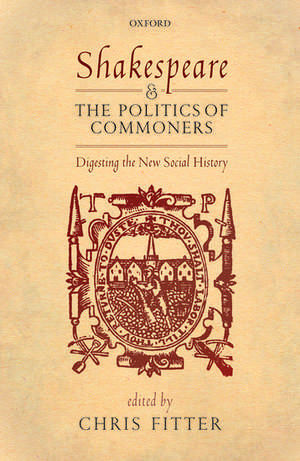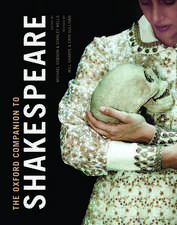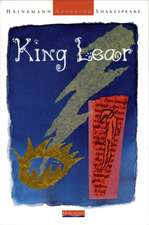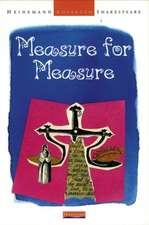Shakespeare and the Politics of Commoners: Digesting the New Social History
Editat de Chris Fitteren Limba Engleză Hardback – 26 iul 2017
Preț: 500.12 lei
Preț vechi: 715.07 lei
-30% Nou
Puncte Express: 750
Preț estimativ în valută:
95.73€ • 104.02$ • 80.46£
95.73€ • 104.02$ • 80.46£
Carte tipărită la comandă
Livrare economică 10-16 aprilie
Preluare comenzi: 021 569.72.76
Specificații
ISBN-13: 9780198806899
ISBN-10: 0198806892
Pagini: 280
Ilustrații: 4 halftones
Dimensiuni: 175 x 241 x 24 mm
Greutate: 0.58 kg
Editura: OUP OXFORD
Colecția OUP Oxford
Locul publicării:Oxford, United Kingdom
ISBN-10: 0198806892
Pagini: 280
Ilustrații: 4 halftones
Dimensiuni: 175 x 241 x 24 mm
Greutate: 0.58 kg
Editura: OUP OXFORD
Colecția OUP Oxford
Locul publicării:Oxford, United Kingdom
Recenzii
Chris Fitter's rich introduction to this collection masterfully surveys recent developments in the 'new social history' and then considers the range of contemporary criticism in terms of the politics of the plays ... Taken as a whole, this collection demonstrates that there really is a 'new', or newly rediscovered, social criticism that excavates the voices and politics of commoners.
For Fitter, Shakespeare is a 'protest playwright' who 'anatomizes the hard heart of early modern England in solidarity with the subjected and the unfranchised', a 'radical' who stages 'the anguish displacing commonweal, and the aching politics of commoners' (p. 233).
Overall, this is a rich and rewarding collection that merits and will surely receive serious critical attention.
What this collection does, eruditely and provocatively, is set the political cat loose among the pigeons. For the past forty years we have seen what has become something of a stalemate develop in the debate between New Historicists and Cultural Materialists over ideas of subversion of authority within Shakespeare's texts and performance, and the containment of any such subversion through state censorship and aristocratic patronage. What Chris Fitter and his contributors manage to do is bring significant historical evidence to bear on this debate and reignite arguments surrounding the politics of power on the early modern stage.
A welcome intervention
[Annabel] Patterson contributes a lively afterword to this excellent collection that reopens some of the questions posed by her work ... Chris Fitter makes a compelling case that this represents a neglected opportunity ... and provides a valuable overview of the key conclusions reached by a generation of social historians. A new understanding of politics as involving continuous interaction between commoners and elites has been one of the signal achievements of this continuing historical research ... as the editor concludes, 'The politically thinkable in Shakespeare's England traversed an astoundingly wide discursive spectrum' ... This collection demonstrates how dialogue between historians and literary critics can be convened ... and the approaches of social history inspire new critical readings.
For Fitter, Shakespeare is a 'protest playwright' who 'anatomizes the hard heart of early modern England in solidarity with the subjected and the unfranchised', a 'radical' who stages 'the anguish displacing commonweal, and the aching politics of commoners' (p. 233).
Overall, this is a rich and rewarding collection that merits and will surely receive serious critical attention.
What this collection does, eruditely and provocatively, is set the political cat loose among the pigeons. For the past forty years we have seen what has become something of a stalemate develop in the debate between New Historicists and Cultural Materialists over ideas of subversion of authority within Shakespeare's texts and performance, and the containment of any such subversion through state censorship and aristocratic patronage. What Chris Fitter and his contributors manage to do is bring significant historical evidence to bear on this debate and reignite arguments surrounding the politics of power on the early modern stage.
A welcome intervention
[Annabel] Patterson contributes a lively afterword to this excellent collection that reopens some of the questions posed by her work ... Chris Fitter makes a compelling case that this represents a neglected opportunity ... and provides a valuable overview of the key conclusions reached by a generation of social historians. A new understanding of politics as involving continuous interaction between commoners and elites has been one of the signal achievements of this continuing historical research ... as the editor concludes, 'The politically thinkable in Shakespeare's England traversed an astoundingly wide discursive spectrum' ... This collection demonstrates how dialogue between historians and literary critics can be convened ... and the approaches of social history inspire new critical readings.
Notă biografică
Chris Fitter is Professor of English at Rutgers University. He gained his PhD from St. John's College, University of Oxford and has taught at Wroxton College and the University of Mississippi. His leading interests are in literature and the natural world, the politics of Shakespearean drama, and representations of poverty in Western literature.


















